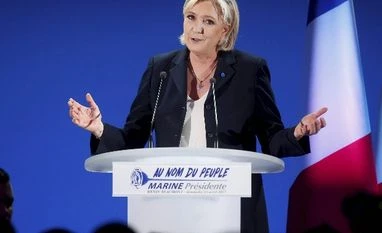The underlying narrative in the French presidential election remains the same as the final vote draws near. Despite the gaps in the republican front against her, Marine Le Pen still looks a long shot to win the run-off on May 7. Most of the opinion polls have Emmanuel Macron winning, taking around 60% of the vote against Le Pen’s 40%. But the far-right candidate is gnawing away at his lead.
Some nervous and experienced pundits, spooked by a “secret” poll, had suggested Le Pen might take as much as 30% of the vote in the first round, providing a platform for victory in the second. Certainly, there were hopes of 28% within her inner circle – but as the wise man once said, never believe the hype, especially when it’s your own.
Le Pen has always known that to win the presidency she needs to appeal to the right wing of François Fillon’s voters and to people who supported right winger Nicolas Dupont-Aignan in the first round. At the same time, she needs to underline the social and anti-globalisation aspects of her programme to win over some who voted for left winger Jean-Luc Mélenchon and cannot stomach Macron. She also hopes a high abstention rate will work in her favour.
It’s not an easy circle to square and there was some hesitation regarding tactics at the beginning of last week. The likes of Marion Maréchal Le Pen were suggesting that to win, the candidate needed to focus more on the politics of identity and authority and less on Frexit and leaving the eurozone. The latter are policies to which French conservative voters will not necessarily subscribe.
Although it is an enormous challenge for Le Pen, there were a number of chinks of light. While Fillon and the defeated Socialist candidate Benoît Hamon called on their voters to support Macron, others were more circumspect. Mélenchon refused to follow suit and give a clear consigne de vote to his supporters, knowing how much animosity there is within his own camp towards Macron.
It wasn’t until the end of last week, when Le Pen made a direct play for his supporters that Mélenchon made it clear that abstention wasn’t really an option (though he still stopped short of supporting Macron). Nevertheless, in an online poll, Mélenchon’s supporters confirmed their leader’s decision not to call for a vote for Macron.
At that point, Le Pen was already well down the road to negotiating a deal with the right-wing Eurosceptic candidate, Dupont-Aignan. On April 28, he announced his support for her, and a day later she announced that if elected, he will be her prime minister.
Dupont-Aignan is a former adviser to various ministers who became a professional politician in the late 1990s. He joined the UMP in 2002 when it was set up as an amalgamation of France’s three main right-wing parties and he took a respectable 14% of the vote to lead the party in 2004. In 2007, he split from Nicolas Sarkozy over European policy. Posing as an orthodox Gaullist eurosceptic, Dupont-Aignan set up his own party, Debout la République (DLR – Rise Up, the Republic) and stood for the presidency in 2012. Then, he won 640,000 votes, or 1.8%. This time, he took 1.7m votes (4.7%) and cost Fillon second place in the first round.
Dupont-Aignan’s declaration of support for Le Pen has not gone down well with his party, with a number of senior figures denouncing the move. In one tweet, a member of DLR asked if one could really imagine de Gaulle siding with some of Le Pen’ less savoury supporters.
Meanwhile, at the Place des Pyramides under the gold statue of Joan of Arc – a public space appropriated by the French nationalists before the First World War and reclaimed by Jean-Marie Le Pen in the 1980s – the far-right patriarch called on all patriots to vote for his daughter, a speech greeted with warm applause by the crowd of … 200.
Both Macron and Le Pen addressed rallies of supporters on May 1. At Villepinte, Dupont-Aignan performed the role of warm-up act, before Le Pen launched into an address that, it later emerged, was plagiarised, in large parts, from a speech Fillon gave in April .
But national attention will turn now to the TV head-to-head scheduled for May 3. So far, Le Pen has been ineffective in TV debates, but this sort of combat might suit her better. Anything can happen. And anything sometimes does.
Paul Smith, Associate Professor in French and Francophone Studies, University of Nottingham
This article was originally published on The Conversation. Read the original article.
To read the full story, Subscribe Now at just Rs 249 a month
Already a subscriber? Log in
Subscribe To BS Premium
₹249
Renews automatically
₹1699₹1999
Opt for auto renewal and save Rs. 300 Renews automatically
₹1999
What you get on BS Premium?
-
Unlock 30+ premium stories daily hand-picked by our editors, across devices on browser and app.
-
Pick your 5 favourite companies, get a daily email with all news updates on them.
Full access to our intuitive epaper - clip, save, share articles from any device; newspaper archives from 2006.
Preferential invites to Business Standard events.
Curated newsletters on markets, personal finance, policy & politics, start-ups, technology, and more.
Need More Information - write to us at assist@bsmail.in
)